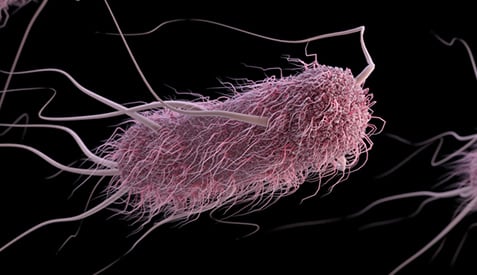
E. coli (Source: CDC)
State health officials and the Centers for Disease Control and Prevention (CDC) have issued an urgent health warning due to a rapidly spreading E. coli outbreak.
A rapid-spreading E. coli outbreak is responsible for at least 29 cases of illness in the states of Michigan and Ohio, according to NPR.
15 of the confirmed cases were reported in the state of Michigan, while 14 were in the state of Ohio. Although there have been no confirmed fatalities linked to the outbreak, at least nine people have been admitted to hospitals.
The source of the outbreak is still unknown, according to the reports.
“A CDC investigation notice regarding a multistate outbreak of E. coli O157 infections is now live,” CDC said in a statement.
“A food has not yet been identified as the source of this fast-moving outbreak. So far, illnesses have only been reported from Michigan and Ohio,” the agency said.
The actual amount of individuals who have become ill as a result of this outbreak is “likely higher than the number reported by CDC.”
“Michigan and Ohio have both reported large increases in the number of coli infections in their states. Public health officials are working to determine how many of these infections are linked to the outbreak,” the agency stated.
Local and state health officials are conducting interviews to determine what, if anything, may have caused an illness such as the “foods they ate in the week before they got sick.”
According to Mayo Clinic, Escherichia coli (E. coli) bacteria normally live in the intestines of healthy people and animals. You may be exposed to E. coli from contaminated water or food especially raw vegetables and undercooked ground beef.
When handling or preparing food, it is important to remember these four procedures to reduce your risk of becoming ill from E. coli, the CDC recommends to: clean, segregate, cook, and chill.
Here’s what you should do according to CDC:
What You Should Do:
- Call your healthcare provider right away if you have severe coli symptoms.
- If you have symptoms of coli, help us solve this outbreak:
- Write down what you ate in the week before you got sick.
- Report your illness to your local or state health department.
- Answer public health officials’ questions about your illness.
- Follow these four food safety steps to prevent getting sick from coli: clean, separate, cook, and chill.
About E. coli:
- Symptoms of Shiga toxin-producing coli (STEC) infection vary for each person, but often include severe stomach cramps, diarrhea (often bloody), and vomiting. Some people may have a fever, which usually is not very high (less than 101˚F/38.5˚C).
- Most people get better within 5 to 7 days. Some infections are very mild, but others are severe or even life-threatening.
- Most people with a STEC infection start feeling sick 3 to 4 days after eating or drinking something that contains the bacteria. However, illnesses can start anywhere from 1 to 10 days after exposure.
- Contact your healthcare provider if you have severe symptoms of coli, such as diarrhea that lasts for more than 3 days or diarrhea that is accompanied by a fever higher than 102˚F, bloody diarrhea, or so much vomiting that you cannot keep liquids down and are not peeing much.
The post Here We Go: Health Officials Sound the Alarm Over a Fast Spreading E. coli Outbreak in Michigan and Ohio appeared first on The Gateway Pundit.
